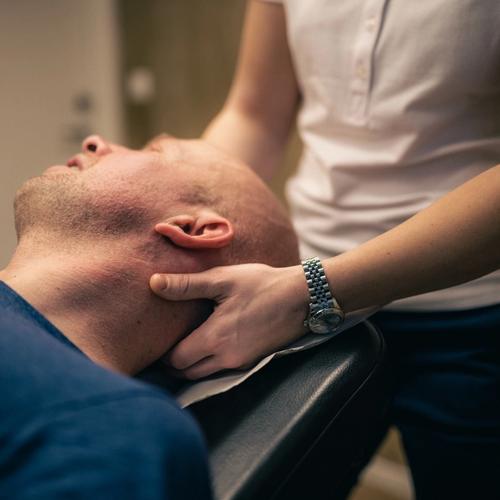Tension headache
Tension headache is a common type of headache characterized by a pressing, dull pain that often surrounds the entire head. It can be caused by stress, tension in the neck and shoulder muscles, poor posture, or lack of sleep. The pain can range from mild to moderate and feels like a tight band around the head. Most people experience tension headaches from time to time, and they can last for hours or days
At Dr. Dropin, we have skilled practitioners who can assess your headache and help you receive the appropriate treatment.
See availability
What are you looking for?
Symptoms of tension headache
If you have tension headache, you may experience one or more of the following symptoms:
- A pressing, dull pain that typically surrounds the entire head.
- A sensation of tightness or pressure, often described as if wearing a tight band around the head.
- Mild to moderate discomfort that is generally not aggravated by physical activity.
- Tension headaches can be episodic or chronic and may vary in intensity.
Seeking professional guidance for an accurate diagnosis and treatment is essential if you experience these symptoms.
See availability
Treatment
The treatment of tension headaches often involves various approaches to achieve specific treatment goals. Here are some common treatment methods:
- Pain relief: The use of pain medications can help reduce the headache.
- Stress management: Learn techniques to manage stress, as stress is often a triggering factor for tension headaches.
- Physical activity: Regular exercise and relaxation exercises can help relieve tension in neck and shoulder muscles.
- Good sleep hygiene: Ensure adequate sleep, as lack of sleep can trigger headaches.
- Massage and relaxation techniques: Neck and shoulder massage, as well as deep breathing exercises, can help relieve tension.
- Ergonomic changes: Adjust your workspace and sitting posture to reduce strain on the neck.
- Hydration and healthy nutrition: Drink enough water and maintain a balanced diet.
It's important to understand that the treatment for tension headaches should be tailored to individual needs and may vary from person to person. Consult with a doctor or other qualified healthcare professional to develop an effective treatment plan.
See availabilityWhen should you book an appointment?
If you recognize the symptoms above and are experiencing any of the following issues, we recommend seeking professional guidance:
- Pain or reduced mobility that has persisted for more than a week without improvement.
- Severe symptoms that you need assistance in reducing quickly.
- Symptoms that cause you concern or that you believe may be due to more serious conditions.
Remember that early assistance from a therapist can reduce the duration of your issues and contribute to achieving the best possible outcome. You should never worry that your problems are "too small" - we take all types of issues seriously.
See availability
Meet our therapists
Our physical team consists of skilled and committed therapists. We have solid expertise, clinical experience and Norwegian authorization, so you can trust that you get the help you need. You do not need a referral to book an appointment with us.
We know that the right competence and good chemistry are important. Below you can therefore get to know our therapists better.


Daniel Vestøl
Chiropractor, Bislett
General Chiropractic | Headache | Acute and prolonged dizziness | Prolonged pain

Lovisa Klingenberg
Chiropractor, Økern
General Chiropractic | Acute and prolonged dizziness | Prolonged pain | Diagnostic ultrasound

Hildegunn Lilja Solsvik
Physiotherapist, Majorstuen
General physiotherapy | Psychomotor physiotherapy | Acute and long-term dizziness | Vestibular disorders | Tinnitus | Meniere's disease

Wictor Borgström
Physiotherapist, Sandvika
General Physiotherapy | Rehabilitation | Acute and prolonged dizziness

Heidi Prytz
Chiropractor
General Chiropractic | Back | Neck | Women's Health | Pregnancy complaints | Needle treatment | Headache

Ana-Maria Stefan
Chiropractor, Majorstuen
General Chiropractic | Headache | Women's Health | Pregnancy | Prolonged pain

Ingrid-Johanne Nilsen
Chiropractor, Bergen city center
General Chiropractic | Headache | Women's health | Pregnancy

Lina Beate Varhaug
Chiropractor, Stavanger sentrum
General Chiropractic | Back | Neck | Women's Health | Pregnancy | Shock wave therapy | Headache | Dizziness

Nikolai Nyenget
Chiropractor, Trondheim city center
General Chiropractic | Sports injuries | Shock wave treatment | Foot analysis and sole fitting | Plantar fasciitis | Headache | Dizziness
Use your health insurance
We cooperate with all the major insurance companies, so that you can use your health insurance with us if you have headaches or other problems.
Read more about how to use your health insurance here
What can you do by yourself?
Although treatment for tension headaches typically involves professional guidance and therapy, there are several measures you can take on your own to relieve symptoms and improve the condition:
- Follow recommended exercises: If your therapist has given you exercises to do at home, it is important to perform them regularly.
- Sleep and relaxation: Ensure that you get enough sleep, have good sleep quality, and reduce factors that lead to stress that you find challenging to manage.
- Medications: Use over-the-counter pain relievers as directed by healthcare professionals.
If you have not had the condition assessed yet or have deviated from the treatment plan, it is recommended to contact healthcare professionals for further guidance.
See availabilityFrequently asked questions about tension headaches
What is tension headache?
Tension headache is a common type of headache characterized by a pressing, dull pain around the head, often feeling like a tight band.
What is tension headache?
Tension headache is a common type of headache characterized by a pressing, dull pain around the head, often feeling like a tight band.
What causes tension headache?
The causes of tension headache can vary, but it is often related to stress, tension in the neck and shoulder muscles, poor posture, and sleep issues.
What causes tension headache?
The causes of tension headache can vary, but it is often related to stress, tension in the neck and shoulder muscles, poor posture, and sleep issues.
What are common symptoms of tension headache?
Common symptoms include a pressing pain around the head, neck soreness, shoulder tenderness, and sometimes mild nausea
What are common symptoms of tension headache?
Common symptoms include a pressing pain around the head, neck soreness, shoulder tenderness, and sometimes mild nausea
How is tension headache treated?
Treatment of tension headache may involve soft tissue massage, relaxation techniques, pain relievers, physical activity, and stress management.
How is tension headache treated?
Treatment of tension headache may involve soft tissue massage, relaxation techniques, pain relievers, physical activity, and stress management.